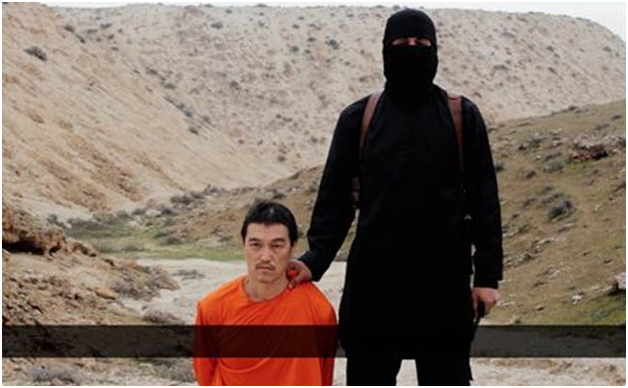Islamic State Kills Japanese Journalist
Islamic State executioner 'Jihadi John' with Japanese journalist who was killed shortly after

NEW DELHI: The Islamic State released a video on Saturday purportedly showing the beheading of Japanese journalist, Kenji Goto.
In the video, Goto was shown kneeling in the desert in an orange jumpsuit with a man clad in black, dubbed “Jihadi John” for his British accent, standing beside him. “To the Japanese government: You, like your foolish allies in the Satanic coalition, have yet to understand that we, by Allah’s grace, are an Islamic caliphate with authority and power, an entire army thirsty for your blood,” the man said in English, according to the Site Intelligence group.
“Abe, because of your reckless decision to take part in an unwinnable war, this knife will not only slaughter Kenji, but will also carry on and cause carnage wherever your people are found. So let the nightmare for Japan begin,” the militant continues.
The video concludes with Goto’s beheading.
Japan immediately issued a condemnation, calling it an “atrocious act of terrorism” and adding that the country was “outraged by the horrific act.”
Goto was being held by the group, his fate seemingly tied to that of captured Jordanian pilot Muath al-Kasaesbeh. Jordan became the first Arab country to openly negotiate with the Islamic State, agreeing to a prisoner swap that involved the release of Sajida al-Rishawi. “Jordan is ready to release prisoner Sajida al-Rishawi if the Jordanian pilot Lieutenant Muath al-Kasaesbeh is released and his life spared,” the government spokesman Mohammad al-Momani said on state television.
However, as the deadline for the swap approached, another recording emerged linking Goto to Kasaesbeh. “I am Kenji Goto. This is a voice message I've been told to send to you. If Sajida al-Rishawi is not ready for exchange for my life at the Turkish border by Thursday sunset 29th of January Mosul time, the Jordanian pilot Muath al-Kasaesbeh will be killed immediately" -- was posted to YouTube a few days ago.
As negotiations seemed to have stalled, this video of Goto’s beheading has emerged in response.
Previously, Goto made an appearance in a video with another Japanese hostage Haruna Yukawa. The two men were dressed in orange jumpsuits alongside a knife-wielding militant dressed in black. In the video, the militant demanded $200 million from the Japanese government within a period of 72 hours in exchange for the two captives. Yukawa was reportedly executed soon after.
The Islamic State has a number of foreign hostages, of which, in addition to Goto and Yukawa, American aid worker Peter Kassig, US journalists James Foley and Steven Sotloff, and British aid workers David Haines and Alan Henning have been the most prominent executions. These executions were recorded -- the men all dressed in orange jumpsuits -- and released by the Islamic State accompanied by messages directed to the UK and US for their role in bombing the militant group in Iraq and Syria.
Another prominent hostage, Briton John Cantlie, has made numerous video appearances by has not been executed. Instead, Cantlie has appeared in eight videos, the latest being a documentary style video released earlier this month in which Cantlie visits a marketplace, a hospital and a police station and claims that life in Mosul, contrary to western reports that depict the city as decrepit, is stable.
Although the hostages from the UK and US, barring Cantlie, seem to be lined up for execution, a number of hostages from a host of countries have reportedly been securely released on the payment of ransom money. The countries involved however have not confirmed the terms of exchange.
Released hostages include Greta Ramelli and Vanessa Marzullo -- two Italian aid workers who returned home last week after being held hostage in Syria for over five months. Javier Espinosa, Ricardo Garcia Vilanova and Marc Marginedas, three spanish journalists, were released last march. French journalists Edouard Elias, Didier Francois, Nicolas Henin and Perre Torres were released in April last year after being held for ten months. Nicolas Hammarstrom and Magnus Falkehed, Swedish freelance journalists, were released early January. The Swedish government declined to comment on how they were set free.
Several others, however, are believed to still be being held hostage by the militants, including al-Kasaesbeh. The group reportedly also holds captive Father Paolo Dall’Oglio, an Italian Jesuit priest who traveled to Syria and went missing in July 2013. An unidentified American aid worker and three workers for the International Committee of the Red Cross are also being held by the Islamic State militants. Their identities have not been revealed by the US and the Red Cross because of fear for their safety.



